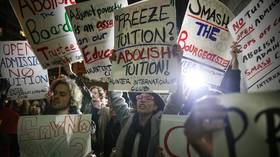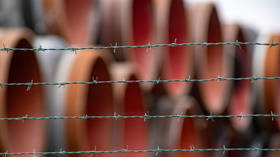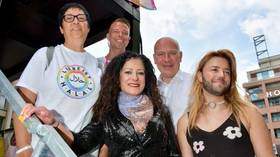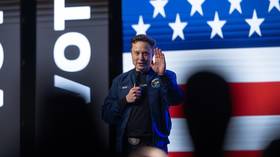Teacher, leave those kids alone: Why Americans abandon public schools and their 'agendas'
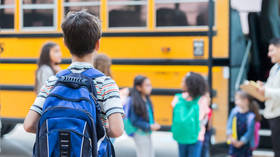
The United States has reached a tipping point when it comes to big government vs government by the people, and nowhere is this more apparent than in the education system. The Covid-19 pandemic, as terrible as it was, had one unexpected but productive side effect – it pulled back the curtain on what government schools (aka “public” schools) are teaching kids. At the same time, it exposed what can go wrong when a tyrannical city council, teachers’ unions, and school board members pile on mandates, restrictions, and put students last. For many families, opting out has been the only option.
In 2020 and 2021, online learning via Zoom or other video conferences meant the classroom was brought into the living room. And many parents did not like what they saw and heard. A kind of awakening took place, and is still taking place. Controversial topics like critical race theory and gender ideology were exposed and debated, seemingly for the first time. Parents began showing up at school board meetings and addressing their concerns – and in some cases, were met with hostility.
Meanwhile, social media drew attention to public school teachers who were caught speaking to elementary-aged children about gender and “preferred pronouns” – topics that, at this time, tread the border between education and political indoctrination. Some of the more outrageous examples of politically-driven, unhinged teachers were brought to public attention by the Twitter account Libs of Tik Tok. Despite the account being suspended from the platform (and reinstated after some backlash) hundreds of teachers were seen, for the first time, bragging on camera about teaching transgenderism to students, and inappropriately sharing their sexuality and personal lives.
‘Year of the parent’
Alarm bells went off from Florida to Virginia to California, which prompted parents to run for school board positions, remove their children from school altogether, and get more involved in their children’s’ education. Conservatives have even dubbed 2022 “the year of the parent.” And why shouldn’t it be? Parents have the right, after all, to know what their children are being taught, and ultimately decide what is best for them and their family. Anyone who says otherwise needs to have their motives questioned – which is exactly the intent behind the new docu-series out by Project Veritas. Released on August 30th, “The Secret Curriculum” goes undercover to expose educators. One teacher in the series goes so far as to coerce high-schoolers into pledging allegiance to antifa.
And while it’s one thing to speak up at school board meetings, it’s another to see the results of all of this at the polls. Republican Governor Glenn Youngkin solidly beat out his Democrat opponent in Virginia last year – a state that hasn’t seen a Republican in that office since 2009 – because he addressed the concerns parents have about “woke” school board members and educators.
In blue states like my own, parental frustration had more to do with schools mandating masks and coronavirus vaccines, despite very few school-wide outbreaks and the unlikelihood of children experiencing extreme illness. While some religious exemptions were in place for vaccinations, masks became a point of contention that pushed many to breaking point. I spoke with a neighbor here in Los Angeles over the summer as she was still contemplating whether to send her seven-year-old to school in the fall. She had never considered home schooling as an option before Covid, but confided that she just wasn’t willing to mask her child for eight hours per day – and she is not alone. Her sentiments are felt by many in California, and their exasperation resulted in the “let them breathe” coalition, which gives parents resources to fight mask mandates.
It should come as no surprise then, that California, which had some of the strictest school Covid policies in the nation, saw a decrease in enrollment. Cal Matters reported that school enrollment saw a decline of more than 100,000 students from 2020 to 2021. That number is expected to increase.
In a recent blog titled “The School Board Takeover” California legislator Kevin Kiley noted that 50,000 children did not show up for the first day of school in the Los Angeles Unified school district. He encourages parents running for California school boards. Still, more and more moms and dads are opting out altogether. Homeschooling has trended steadily upward for decades, with the biggest increase jumping 3.4 to 9% between the fall of 2019 and fall of 2020.
Is homeschooling better?
Homeschooling is not a new phenomenon in the United States, and is, in fact, rooted in American tradition. But do children fare better or worse when taught at home? A look at the data paints a positive outlook on the homeschool front, showing that 67% of homeschoolers graduate from college, compared to 59% of public-school students. The homeschoolers also score better on achievement tests, averaging 72 points higher on SAT’s. These numbers held fast across all demographics.
Ideally, most parents want their children interacting and engaging with other kids in a classroom and at playgrounds and ball fields, but not if it comes at the expense of handing their children’s minds over to people and institutions they don’t trust. And certainly not at the expense of hindering their speech and social development with masking – which is understandably a deep concern among most parents. Humans need to see entire faces to process most social cues. That being obvious, children also need to spend time with other kids their own age in an environment outside the home.
Historically, conservatives and Christians were more likely to favor homeschooling, along with the rural population. Many assumptions and stereotypes have been made based on those demographics. And then there is the looming question of whether all parents are qualified to educate. Most parents are able to find resources they need for learning at home, but not in every case. This brings up the issue of poverty in America, and the feasibility of being financially able to quit the system. In some low-income families, kids may depend on schools for two meals per day.
Another potential downside of avoiding formal education – and one that can’t be solved so readily – is the possibility for greater societal divide. If it is verifiably true (and it may not be) that politically conservative parents are more likely to homeschool their children than their liberal counterparts, then this could create more polarization in the country over time. The two competing world views will have even fewer opportunities to intermingle and find common ground than they do currently, and that at a formative stage of the young people’s lives. This outcome would be difficult to measure, however, especially since statistics show that homeschooled children participate in an average of five activities outside the home. Learning at home need not mean isolation, but it does require extra effort to create social engagement.
Ultimately, it is school choice (private schools, charter schools) and the option to avoid government schools altogether that ensure freedom in education. And for those who opt out, it is up to the parents to make sure their kids aren’t missing out on the social experiences they need. If young adults end up choosing college over trade school, they must be sufficiently prepared. Fortunately, there are abundant resources available, even for middle- and high-school-aged students. I know parents who are thrilled with Hillsdale College’s online courses because they offer a variety of history, economics, literature and classics courses, complete with tests.
Homeschooling is understandably not for everyone. Not all parents (or kids) want to go that route, and not all families are able or equipped to make it happen. But that doesn’t necessarily leave such families at the mercy of public-school curricula. More and more are choosing to get involved, run for their local school boards, become more aware of what is being taught in their children’s classrooms and hold the teachers accountable when necessary.
The statements, views and opinions expressed in this column are solely those of the author and do not necessarily represent those of RT.

